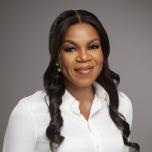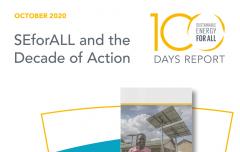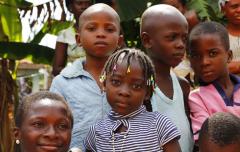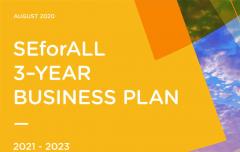2020 in review: A pandemic, renewed urgency on energy access and some optimism
Looking back over my first year leading Sustainable Energy for All (SEforALL), it has been a year full of surprises, unprecedented challenges and proud achievements.
The COVID-19 pandemic has underscored that energy access saves lives. Yet despite some progress in recent years, the latest Sustainable Development Goal 7 (SDG7) data show just under 800 million people still lack access to electricity and 2.8 billion people – a third of the world’s population - have no access to clean cooking fuels and technologies.
While the pandemic poses continued challenges, we can still achieve SDG7 – access to affordable, reliable, sustainable and modern energy for all – by 2030 if we act with the urgency and ambition this moment calls for. Achieving this future is at the very core of SEforALL’s mission. Even in the midst of this surreal year, there has been much success and work I am particularly proud of at SEforALL. Here are my top seven highlights.
1. New SEforALL business plan
Work that began at the start of 2020 outlining a new strategic direction for the organization – SEforALL 3.0 – culminated with the release of our new 3-year business plan in August, laying out our ambitious vision to support faster progress on universal energy access and energy transitions. 2020 was the beginning of the final ‘Decade of Action’ to achieve SDG7, and under our new business plan, SEforALL has strategically chosen to strengthen global agenda-setting while expanding activities to an engagement model that prioritizes data-driven decision-making, partnerships with high-impact countries and implementation on the ground. Just in time to approve our new business plan, we were pleased to have Francesco Starace, CEO and General Manager of Enel S.p.A., named as the new Chair of the SEforALL Administrative Board.
2. Energy access and COVID-19: Supporting the global response
Access to energy is at the heart of combatting the pandemic. That is why SEforALL adjusted our programme of work and launched new efforts to support energy access action at this critical time. From hosting Virtual Donor Summits in support of off-grid companies who are on the frontlines providing electricity for remote, vulnerable populations, to our ongoing Powering Healthcare work coordinating the energy and health sectors to ensure health clinics have the energy solutions they need – our work has focused on being a voice for those that are most vulnerable in the pandemic. We continue to compile new resources on our COVID-19 page to support delivering power when and where it is needed the most, and we are now focusing on the planning needed for vaccine distribution.
3. Helping countries to Recover Better
As countries focused on recovery from the economic impacts of the COVID-19 pandemic, SEforALL compiled and shared data and evidence to demonstrate how investment in sustainable energy can help countries recover better while closing energy gaps. Through the release of regional Recover Better with Sustainable Energy guides and high-level outreach to governments, SEforALL advocated for using this once in a generation opportunity to stake out an ambitious ‘recover better’ strategy to deliver resilient economic growth, new jobs and sustainable energy for all over the long-term.
4. Confirming the first UN High-Level Dialogue on Energy in over 40 years
Delivering sustainable energy for all is critical for catalysing progress on all SDGs and climate action. Which is why, earlier this year, the UN announced a High-Level Dialogue (HLD) on Energy that will take place in 2021 during the UN General Assembly – the first high-level meeting on energy in over four decades. With my role as the Global Champion and Co-Chair for the HLD, along with Co-Chair UNDP Administrator Achim Steiner and UN DESA Under-Secretary-General Liu Zhenmin, SEforALL is playing a key role in the planning and organization of the HLD, including the development of new ‘Energy Compacts’ that will allow governments, business and other stakeholders to sign up to specific voluntary targets and initiatives in support of SDG7.
5. Partnership with the UK COP Presidency and the G20
With the COP26 climate conference now scheduled to take place in Glasgow in 2021, SEforALL worked in partnership with the UK COP Presidency this year on an Energy Transition Campaign to develop data-driven business cases for countries to transition away from fossil fuels and towards clean energy. A newly established Energy Transition Council will take this work forward over the coming year to convene leadership and support countries in their clean energy transitions. I was delighted to be named Co-Chair of the Council with Secretary of State Alok Sharma, COP26 President.
Over the year, SEforALL also worked closely with the G20 Presidency to ensure energy access was prominent on the agenda. This work culminated with the official communique from Energy Ministers formally endorsing a G20 Initiative on Clean Cooking and Energy Access, representing the highest level of support possible within the G20 framework.
SEforALL is also committed to engaging youth around the world in achieving SDG7, which is why I am delighted we have just announced the first-ever SEforALL Youth Summit to take place in February 2021.
6. Pushing for greater, innovative SDG7 financing through the Universal Energy Facility
It’s clear we need new solutions to vastly scale up finance for energy access. That is why SEforALL, along with key partners, operationalized and launched a new results-based financing facility this year, the Universal Energy Facility. The facility, which has opened in Madagascar and Sierra Leone for mini-grid projects, will provide incentive payments to eligible organizations that deploy clean energy solutions and provide verified new energy connections. The Universal Energy Facility will expand to additional countries and include solar home systems and clean cooking over the coming year.
7. Continuing to lead on SDG7 data
SEforALL continued to produce critical data to support faster SDG7 progress. This includes new research on sustainable cooling from our new Chilling Projects report. The data show major gaps in cold chains and providing cooling for all with efficient energy sources. This work will help inform strategies for the storage and distribution of COVID-19 vaccines, especially in countries with large energy access deficits.
This year’s Energizing Finance research continued to show chronic underinvestment in energy access. The shortfall in finance has reached acute levels in many of the 20 high-impact countries across Africa and Asia with the largest access gaps.
The first State of the Global Mini-Grids Market Report 2020 by the Mini-Grids Partnership was also published by SEforALL and BloombergNEF to raise awareness, mobilize investments and serve as a benchmark to measure progress in the sector for decision-makers.
At the start of the year, we also launched our Energy Safety Nets research, which provides first-of-its-kind research to inform best practices at the intersection of energy policy and social assistance in order to support the very poor and vulnerable with access to modern energy services.
We undertook extensive research and analysis to support the Government of Nigeria in executing its plans to deliver 5 million solar connections by 2023, particularly by working with a geospatial platform provider to leverage data for identifying connection sites optimized for commercial viability. Our country-level engagement with Nigeria also included developing a strategy for the localization of solar value chains to establish a local and sustainable solar energy industry. We have also been providing Sierra Leone with analysis around subsidy mechanisms and tariff structures for mini-grids.
Closing thoughts
With the COVID-19 pandemic slowing down progress on energy access and clean energy transitions in 2020, SEforALL’s work will be even more crucial in 2021. We will continue to focus on implementation and advancing the tangible actions and programmes that result in clean energy connections on the ground. But we will also continue elevating the importance of energy access, particularly in the lead up to the UN High-Level Dialogue on Energy in September and COP26 in November 2021, with drumbeat messaging that the world cannot achieve net zero emissions by 2050 without first achieving universal access to sustainable energy by 2030.





